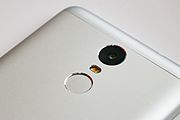Fingerprint scanner
This article possibly contains original research. (November 2019) |
Fingerprint scanners are security systems of biometrics. They are used in police stations, security industries, smartphones, and other mobile devices.
Function[]
Everyone has patterns of friction ridges on their fingers, and it is this pattern that is called the fingerprint. Fingerprints are uniquely detailed, durable over an individual's lifetime, and difficult to alter. Because there are countless combinations, fingerprints have become an ideal means of identification.
Types of fingerprint scanners[]
There are four types of fingerprint scanners:[1] optical scanners, capacitance scanners, ultrasonic scanners, and thermal scanners. The basic function of every type of scanner is to obtain an image of a person's fingerprint and find a match for it in its database. The measure of the fingerprint image quality is in dots per inch (DPI).[2]
- Optical scanners take a visual image of the fingerprint using a digital camera.
- Capacitive or CMOS scanners use capacitors and thus electrical current to form an image of the fingerprint. This type of scanner tends to excel in terms of precision.
- Ultrasonic fingerprint scanners use high frequency sound waves to penetrate the epidermal (outer) layer of the skin.
- Thermal scanners sense the temperature differences on the contact surface, in between fingerprint ridges and valleys.
All fingerprint scanners are susceptible to be fooled by a technique that involves photographing fingerprints, processing the photographs using special software, and printing fingerprint replicas using a 3D printer.[3]
Construction forms[]

There are two construction forms: the stagnant and the moving fingerprint scanner.
- Stagnant: The finger must be dragged over the small scanning area. This is cheaper and less reliable than the moving form. Imaging can be less than ideal when the finger is not dragged over the scanning area at constant speed.
- Moving: The finger lies on the scanning area while the scanner runs underneath. Because the scanner moves at constant speed over the fingerprint, imaging is superior.
Usage form[]
This section needs expansion. You can help by . (July 2021) |
Stand-alone readers[]
Microsoft released a fingerprint reader in 2005.[4]
Integrated readers[]
From early 2000, some laptops with PC Card support can be equipped with readers; for example, Compaq Armada E500 can be optionally equipped by external fingerprint reader since 2000 - the reader module was released by Toshiba.[5] IBM produced laptops with integrated readers since 2004.[6] The Apple's marketing name of electronic fingerprint recognition, known as Touch ID, was introduced in 2013 only for smartphones, and laptop option was released only in 2016. The implementation was delayed until 2013 just because the integrated with optical trackpad scanner were be patented by RIM (Blackberry) in 2004.[7] Blackberry produced smartphones with readers since 2010 - the first model with feature was a budget Blackberry Curve.[8]
See also[]
| Wikimedia Commons has media related to Fingerprint scanners. |
- Fingerprint#Capture and detection
References[]
- ^ Rouse, Margaret (March 2021). "Experts Agree: Face ID Is Not The Answer, In-Display Fingerprint Sensors Are". display. E3displays. Retrieved 8 March 2021.
- ^ Sadasivuni, Kishor Kumar; Houkan, Mohammad Talal; Taha, Mohammad Saleh; Cabibihan, John-John (August 2017). "Anti-spoofing device for biometric fingerprint scanners". 2017 IEEE International Conference on Mechatronics and Automation (ICMA). IEEE: 683–687. doi:10.1109/icma.2017.8015898. ISBN 978-1-5090-6758-9. Archived from the original on 2021-01-17. Retrieved 2020-10-27.
- ^ Winder, Davey. "Hackers Claim 'Any' Smartphone Fingerprint Lock Can Be Broken In 20 Minutes". Forbes. Archived from the original on 2019-12-19. Retrieved 2019-12-19.
- ^ Luepke, Lara. "Microsoft Wireless IntelliMouse Explorer with Fingerprint Reader". CNET. Retrieved 2021-07-02.
- ^ Vaidya, Gopika. "CNN.com - Technology - Toshiba outfits laptops with fingerprint reader - November 22, 2000". edition.cnn.com. Retrieved 2021-07-02.
- ^ "IBM Introducing Fingerprint Reader into Laptop | Security | TechNewsWorld". www.technewsworld.com. Retrieved 2021-07-02.
- ^ Sacco, Al (2013-10-04). "Before Touch ID: BlackBerry Filed for Trackpad-Fingerprint-Scan Patent in '04". CIO. Retrieved 2021-07-02.
- ^ Cha, Bonnie. "BlackBerry Curve 8520 review: BlackBerry Curve 8520". CNET. Retrieved 2021-07-02.
- Computer hardware
- Fingerprints
- Biometrics
